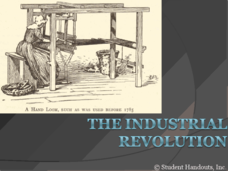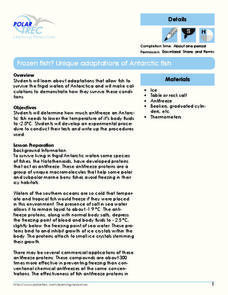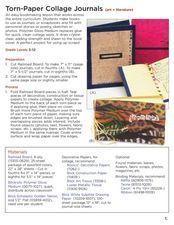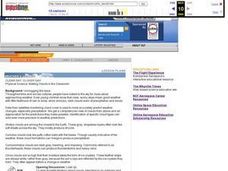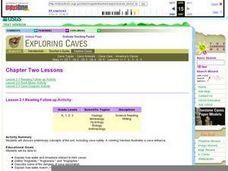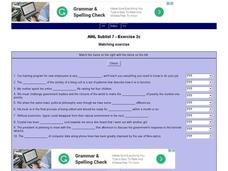Polar Trec
Ice Cores: Modeling Ice Sheets
Ice cores provide scientists with knowledge of historic melt layers, air temperatures, greenhouse gases, and climate stability. Scholars work in groups to build layers representing snow and ice over thousands of years. Then, groups...
Curated OER
The Industrial Revolution
Contrasting between the "Haves" and the "Have-Nots" of 18th-19th century Europe, this presentation explores the social and technological implications of the Industrial Revolution. Inventions, social trends, and scientific breakthroughs...
Curated OER
Winter Wonderland - Winter Olympics and the Water Cycle
After a concise introduction to the water cycle, junior meteorologists access NOAA's average snowfall data. They choose a city to examine in terms of precipitation. Then they look at historical snowfall data and use it to predict snow...
Curated OER
Minerals of the Earth
Unearth this gem of a resource to use in your geology unit! With colorful images, bullet-point text, and links to related videos, it deals with the characteristics, properties, and identification of minerals. There are also slides...
Virginia Department of Education
Mineral Identification
What's the difference between a rock and a mineral? And what properties are used to identify minerals? The first installment of a five-part series on earth materials and processes prompts young scientists to identify a set of...
Polar Trec
Frozen Fish? Unique Adaptations of Antarctic Fish
Some fish contain proteins that act like antifreeze in order for them to live in the frigid waters of Antarctica! High schoolers determine how much antifreeze a fish needs to lower its body temp to -2.5 degrees. Teachers act as a...
Curated OER
Torn Paper Collage Books
An excellent lesson on bookmaking awaits your students! This simple, and easy-to-implement plan should provide you with some excellent student-made products that you'll be proud to send home with them. The instructions are clear, and the...
Science 4 Inquiry
Body in Balance
The human body maintains homeostasis through the interconnection of multiple systems. Young scientists match these connections and discuss how they relate to each other. They apply their knowledge to solve the mystery of a treasure hunter.
Curated OER
Alphabet Tic-Tac-Toe
Use online resources to aid young readers' phonemic awareness. They will look at various sources to practice letter-sound relationships. They also are assessed using a rubistar rubric. Quite a few resources are given for this...
Curated OER
Sea Water Freeze
Students observe how salinity affects the time it takes water to freeze. They participate in an experiment to determine that ice is essentially salt-free whether formed from fresh or salt water
Curated OER
Rocks and Minerals
Review the difference between rocks and minerals using this resource. Learners identify and investigate the physical properties of these objects. They create a Venn diagram to compare and contrast types of rocks. This is a motivating way...
Virginia English Bulletin
Book Trailer Projects From Classroom to Community
Invite your pupils to express their understanding of a novel through a collaborative video project. Groups choose a novel from those you have studied in class, select four scenes, storyboard the scenes, film the scenes, edit the film,...
Rain Bird Corporation
Rain Forest Teaching Curriculum
Take young naturalists on an exploration of the world's tropical rainforests with this extensive collection of lessons and activities. Whether its creating leaf and flower prints or investigating the absorption spectrum of...
Curated OER
Gelatin Volcanoes
Students investigate magma flow using gelatin volcano models. In this earth science lesson, students sketch the magma bodies as observed from the top of their model. They explain why magma moves that way.
Curated OER
Effects of Ozone Depletion
Explore the causes of ozone depletion and the effect on plankton, algae, plants, amphibians, and humans. Learn how the Montreal Protocol has possibly helped reverse the decline of the ozone layer. Warning: photos of skin and eye...
International Technology Education Association
Reinventing Time
Take a trip through time. A lesson resource provides instruction on the origin of current measurements for time. The text explains the different tools humans used throughout history to measure time as well as provides examples such as...
SF Environment
Pre-School Composting and Recycling!
You can never be too young to get involved in composting or recycling. Here is a lesson plan that has been made for the very littlest learners and it's all about the importance of conservation. They'll sort compostable and recyclable...
Curated OER
What is the Rock Cycle?
Students investigate the rock cycle. In this geology lesson, students read about the rock cycle on a website and discuss the steps of the rock cycle. Students visit a rock cycle website to complete a quiz. This is the first introductory...
Curated OER
Clear Day, Cloudy Day; Weather, Cloud Types and Formations
Students explore the formation of clouds and different cloud types. Students simulate a cloud formation within a bottle.
Curated OER
Reading Follow-up Activity
Pupils color a worksheet while discussing characteristics and composition of caves.
Curated OER
Virginia Rocks and Minerals
Young scholars explore, via a CD-ROM, the Virginia's five geological regions and discover the rocks and minerals located in each. In stone kits, they examine samples of rocks and minerals and answer questions about them. After...
Curated OER
Exploring Caves
Students explore the various characteristics of caves. Through class discussion and hands on activities, students identify what forces converge in the creation of a cave. They complete review activities at the conclusion of the lesson....
Curated OER
Exploring How Rocks Are Formed
Students examine the three types of rocks. They discover the processes that occur so each type of rock can be formed. They participate in activities to help them see how rocks are formed.
Curated OER
English Vocabulary Skills: AWL Sublist 7 - Exercise 2c
In this online interactive English vocabulary skills worksheet, students answer 10 matching questions which require them to fill in the blanks in 10 sentences. Students may submit their answers to be scored.
Other popular searches
- Making Crystals Experiments
- Making Crystals in Math
- Recipe for Making Crystals
- Making Crystals in Gel

